SPECTRUM XXI PRESS REVIEW

No More Poodles (Dumitrescu/Avram: Rebirth of Avant Garde)
by Ben Watson
see the complete text at
http://www.metamute.org/en/content/no_more_poodles_dumitrescu_avram_rebirth_of_avant_garde
Just when I thought ‘contemporary music' should be renamed ‘missed opportunity', I came across the music of Iancu Dumitrescu and Ana-Maria Avram, two composers from Bucharest in Romania. (...) The Avram and Dumitrescu CDs on their own Edition Minuit label are distributed by ReR Megacorp in Britain and in the rest of the world by the network of ‘avant' labels which drummer Chris Cutler has assiduously knitted together over the last three decades. The fact that Tim Hodgkinson (along with Cutler a member of Henry Cow in the early-'70s) is actively involved with Dumitrescu/Avram - playing bass clarinet in their ensemble, contributing his own pieces - shows that I'm not alone in considering their music as the ‘rebirth of avant garde'.
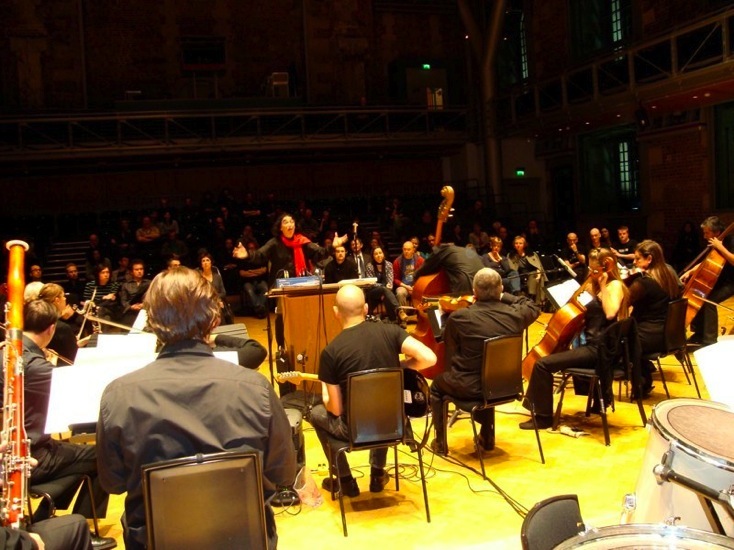
In the classical world, the one critic to champion the music of Iancu Dumitrescu and Ana-Maria Avram has been Harry Halbreich in Paris. His musicological championing hinges on the fact that the two composers are using Romanian scales to bring about the rebirth of a dried-up and moribund tradition: that of European score-writing. While what Halbreich says does not fly in the face of the evidence, it doesn't do enough to celebrate the dazzling importance of what they're doing, which is a rebirth of avant garde as total challenge to generic separations (...) .
But Halbreich has made one ground-breaking remark. He hears ‘a sort of nuclear fission' in the music written by Ana-Maria Avram and Iancu Dumitrescu. This music is explosive, and I can still recall the shock and pleasure of hearing the first CD. It's a bomb going off that doesn't stop going off. Not simply another sonic ‘experience' or ‘adventure', but something which shatters your previous concepts of music, idiom, genre and modernity. The music is correct in the way which polarises opinion and heats the blood. Like a flag raised above a battlefield, it incites a hotspot of enthusiasm which makes all the tepidness around it look like grey and soggy business-as-usual excuses. Timidity and cravenness. Ladies and gentlemen, this is the red-gold TRUTH which the sophisticates and sophists have been hiding beneath their dunghill of sorry irony!
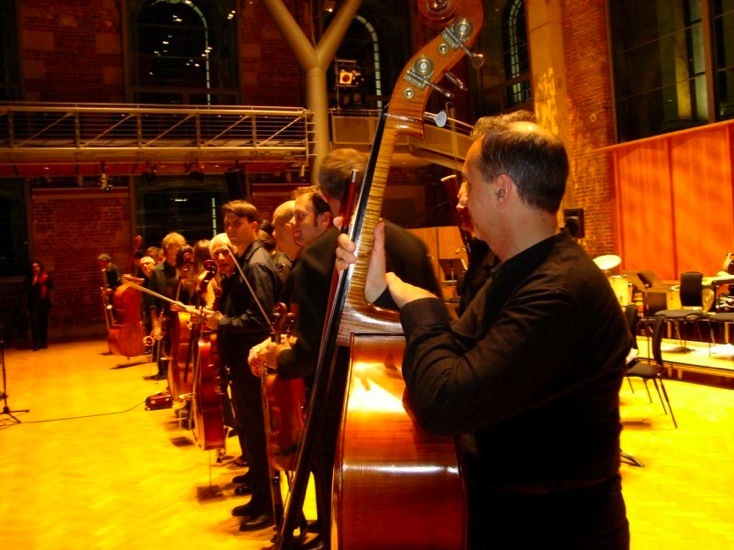
When I read about today's scientists researching cosmology - research which unites study of subatomic particles with speculation about element formation in the first microseconds of our universe - I'm instantly reminded of Iancu's computer music: the sensation of a gigantic, unstoppable cosmic explosion which also has a place for the most minute transformations, also for randomness and indecision and the possibility that everything will close down and reverse and perhaps disappear at any moment. It's imperative that I listen, but I have no idea what might happen next. This sensation recalls every heightened time in our lives. In this, Iancu connects with other great forces in music - Edgard Varèse, Karl-Heinz Stockhausen, John Coltrane, Jimi Hendrix - who deal with objective structure, the physicality of sound, with such untrammelled curiosity and passion that the results are positively erotic. This is because, as Wilhelm Reich said, orgasm is ‘cosmic plasmatic sensation'. Albeit a sensation trivialised and degraded and commodified in this society as a standardised frisson, rather than appreciated for what it actually is: the very point of the universe.
To cross object and subject poles in this way is revolutionary, and begs every question under the sun - including why, in an advanced, technocratic, fullspeed society we still have beggars under the sun. When truth in music is unleashed with this amount of violence and gusto, the ‘social question' is no longer a moral conscience limping behind the gilded carriages of those attending the latest operatic divertissement, but a fighting demiurge which leaps out fully armed. What is this weak and tasteless gruel we've been surviving on for so long? How come we've tolerated so many boring concerts and meaningless experiments? This music refuses the repression introduced into music and theory since the failure of May 1968.
In November 2006, I was given the opportunity to take the above argument to the heartless heart of the postmodern beast: I was invited to contribute to a discussion of the Avram and Dumitrescu music in the Salon d'Or of Hotel de Béhague, the seat of the Romanian Embassy in Paris. What you've just read is based on what I wrote on the Eurostar whilst travelling to the conférence. Naturally, I worried that bringing avant garde and postmodern stars ‘down to earth' in this way may not seem appropriate in a Salon d'Or. Such arguments certainly offended Bernard Stiegler - director of Pierre Boulez's IRCAM (Institut de Recherche et Coordination Acoustique/Musique), and genuflector before the usual postmodern icons - when I voiced them from the floor at a conference organised in London by the journal Radical Philosophy. In his paper, Stiegler seemed to think he could trump the outer reaches of radical thinking on music by reminding his captive audience of Aristotle's idea that listening to music makes you a morally-superior person; whereas all my experience of listening to fantastic music from the last hundred years is that it puts me out of sorts with society.
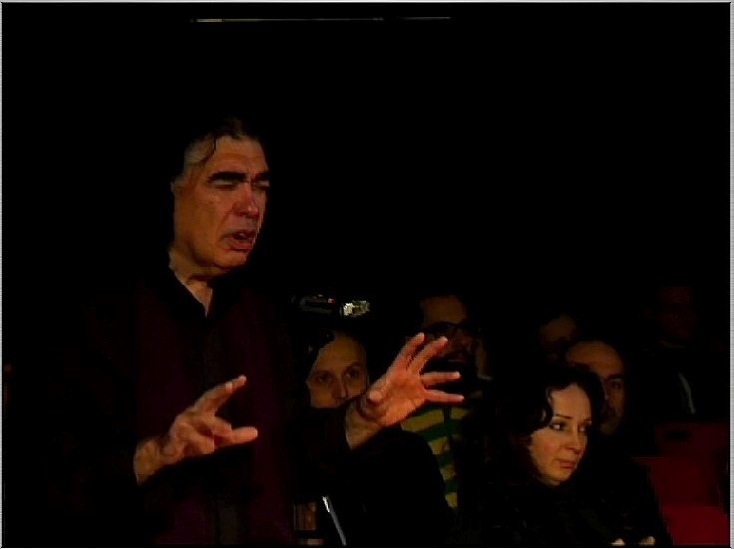
With the wheatfields of Northern France whipping past me, I sucked my Biro and wrote the following on a brown paper bag:
(...) Despite my efforts on the Eurostar, there was actually no opportunity to read this text at the conférence. Harry Halbreich's introductory remarks were so lengthy, it became obvious that he didn't really want to hear what anyone else had to say (...). Having interrupted Halbreich's monologue, I now attempted to create dialogue. I returned to my positive response to the Dumitrescus' music, our common ground at the conférence. Hear the next paragraph as a confessional, peculiarly personal and English.
When I first experienced the music of Ana-Maria Avram and Iancu Dumitrescu, it dawned on me how repressed and restrained and pallid and tight and downright petty was the British ‘radical' music (‘the New Complexity') I'd previously been supporting. These worthy composers just don't seem able to persuade their musicians to attack their instruments with this amount of reckless sensuality (‘gusto'). You'd have to go back to the early days of Free Improvisation (the Tony Oxley Sextet; Bailey & Bennink; Masayuki Takayanagi in Japan) for this kind of advanced instrumental extremism.
I believe this is the reason Tim Hodgkinson got involved, and why Edition Minuit CDs are distributed by ReR Megacorp, Forced Exposure and Metamkine: the power of Dumitrescu music transcends genre, or rather marketing niches, and can speak to listeners whose other listening could be, say, Rod Stewart or Masonna. I take it as axiomatic that the British composers worth taking seriously today would be Brian Ferneyhough, Michael Finnissy, James Dillon or Richard Barrett (today lumbered with the description the New Complexity, a label they all despise), rather than any of the busily promoted approaches to easy listening and film music who use postmodernist excuses about ‘after avant garde' (and a positivist concept of chronology) to justify their contrivances (Nyman, Bryars, Taverner, Martland etc.). I think perhaps the restraint of advanced music in Britain may be a reaction to the overwhelming popularity and visibility of British pop and rock - but something is getting in the way of making great music happen in London right now. Which is why I'm excited with Dumitrescu and Avram!
I'll finish with a brief word about genre. I agree with Ornette Coleman when he said in 1977 that ‘any person in today's music scene knows that rock, classical, folk and jazz are all yesterday's titles' (...) Of course, cultural goods are a special case; but when I look at how Ana and Iancu produce their music - detailed and challenging scores, certainly; but also with ears open to amazing, creative improvisors like Fernando Grillo and Tim Hodgkinson; ears open to the erotics of amplification and the unearthliness of computer-processed sound; their generosity in presenting programmes of music written by like-minds across the globe - I don't see what they are doing is so different from the actions of those who've produced great music in other, supposedly separate genres - like, say, Jelly Roll Morton or Charles Mingus or Frank Zappa or Muhal Richard Abrams or Simon H. Fell. As usual, if we look on the productive side - the progressive aspect of this system, one whose capapabilities and possibilities suggest a whole new social order - we glimpse a universal humanity repressed and denied by the hierarchical snobberies, sectarian narcissism and military spectacles of the consumer society. Peace!
(...) Getting ‘beyond genre' was the task music set itself in the 1980s. John Zorn was patron saint of this brave new classless music world. Yet despite Zorn's brillaince as a bebop altoist, everything was thin and strained: he was to Frank Zappa what Prince was to Hendrix, the semblance but not the action, the concept but not the feeling. But Dumitrescu/Avram are doing it. Their music works through the CD-form, something the ‘classical' world - with their eyes on the ‘great-man' fetishism granted to the dead romantics, or on the spurious glamour sprayed on commercial product - has never been able to achieve. The ‘classical CD', with its ghastly colour photographs of grinning music-student jackasses with clean-pressed shirts and dowdy dresses and its weedy, far-from-the-mic sound quality, has always been a complete abomination.
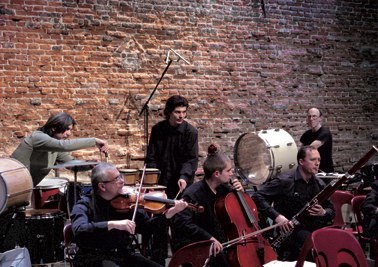
The Dumitrescus work inside the ‘reference tone' (Beefheart), the ‘hear-stripe' (Adorno). Their music may be score-based, but it's heading towards the sonic, not the visual. Closemic'ing and computer electronics bring the acoustic world into discussion with your domestic hi-fi as authentically as Muddy Waters' amps or Sam C. Phillips' Sun Studio. When Iancu Dumitrescu last conducted at Conway Hall, his small audience clapped so long, he had to give them a short encore - he directed his musicians with gestures, got the flute player to lead, and created a new piece. In conducting scored pieces, one of his persistent gestures is to point to himself: ‘watch me! follow my timing! don't read the notes on paper mechanically ...'. This is what real music does when it needs to be realised: it smashes through the curtsies to tradition required of the dullards, and uses all means possible to realise pertinent sound. The Dumitrescus are doing this. When you inflict a CD of theirs on guests, they don't know what the fuck it is: it's sound writhing like a sculpted ameoba, protoplasm in the auricles. It strips music of its social-reference codes, its snob mobiles, its trappings, its exchange value: it breathes embarrassing ooky-nooky in your ear like Beethoven or Ray Charles. It's the real deal. The use-value of modern sound in polemical upsurge! And all the people - professionals, pundits, critics, taste-makers - who've been keeping it from you are ... full of shit.
But I don't want to end with shit. I want to end with shit's use in the biosystem, its necessary provision of nutrients to the bacterial and plant world. Dumitrescu music is the next stage in total thinking, so real you can taste it, so real that only those with minds blocked and stodged by taste and knowledge can't grasp it. It's the music written by someone who read V. I. Vernadsky on the biosphere, grasped the point, and wrote a minute description of the hormones released in their bloodstream by that elation. That tall. Really! See you next time, folks.
_________________________________________________________________
-
*"Le festival Spectrum XXI, qui c'est déroulé pendant dix jours sur plusieures des scènes les plus renommées de Paris, a temoigné encore une fois de la capacité de la musique spectrale de surmonter la distance qui s'ouvre souvent entre la musique contemporaine et ces auditeurs. Représentée cette fois par l'école roumaine, avec en tête le compositeur et chef d'orchestre Iancu Dumitrescu, la musique spectrale semble pouvoir séduire l'oreille avec son ouverture, son humanité évidente, sa liberté, la présence très forte des interprètes, et le sens de quelque chose d'inouï qui serait en train de naître tout devant nous. Spectrum XXI a redressé définitivement, enfin, l'erreur de cette histoire officielle qui accorderait un rôle exclusif à la musique française dans l'évolution de la musique spectrale. On a pu constaté ainsi que les mouvements spectralistes sont nombreux et diverses, et que l'avenir de la musique en depend".
Tim HODGKINSON, - "The Wire", "Resonance" - London -
*
* "j The music, your music was as moving and awe inspiring to me as ever".
Andy WILSON
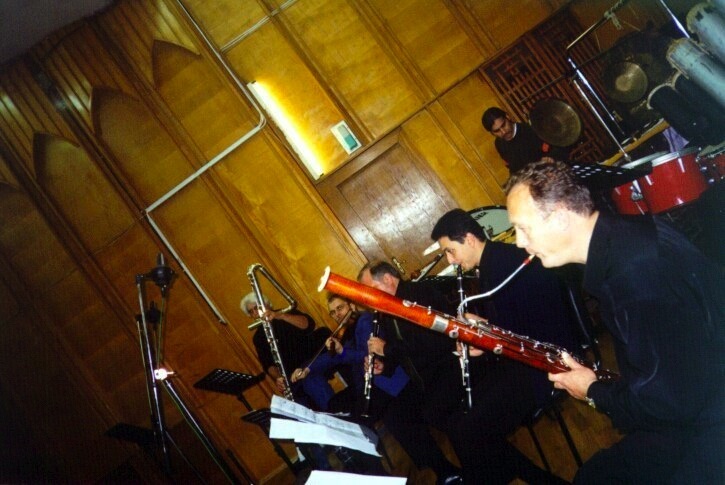
*"Toutes mes félécitations pour cette magnifique série de concerts qui m'ont comblé bien au-delà de mes attentes. " Marc GUISNEUF, Paris
*"Thank you for inviting me. It was a wonderful festival, and I really wish I could have stayed for the last two nights". Robert REIGLE - USA
* " Votre concert a été formidable! Je sens - et n'importe qui peut le ressentrir comme moi- que la musique n'est pas en toi. La musique te transperce, elle vient d'en haut!. Du cosmos, du ciel. Ta musique, Iancu Dumitrescu est vraiment cosmique. Et ta position - comme Scelsi le disait aussi à propos de soi- même - je trouve qu'elle est celle d'un médium. Le cosmique est recepté par ton être et ensuite tu retransmets cette expérience unique- et ça c'etait absolument évident pour moi!
La musique que tu pratiques vient de très loin! Elle n'est pas la tienne, elle passe par toi! C'est la vérité et l'absolu!.
Harry Halbreich - 20. 11. 2006
-
*" Je suis revenu, vous savez, car ce qui se passe ici est un vrai miracle! J'en suis absolument fascinné!. J'étais, ce soir, à l'autre concert ( Création Mondiale d'une oeuvre de Tristan Murai- n.n.). C'est quelque chose d'un autre siècle, qui est dépassé depuis longtemps. Là, c'etait une musique vieille, tandis que moi, je suis fascinné par ce que vous faites, vous!
C'est transcent! Il faut utiliser avec grande parcimonie ce mot : transcendent! Tu comprends? Moi, je ne me permets pas souvent d'utiliser ce mot, et quand même c'est le mot pour l'expérience que j'ai vecu près de vous. Aller jusqu'au bout, voici ce qui est essentiel! Ce que vous faites, ce que vous avez démontré avec ce festival c'est vraiment l'Avenir de la Musique! Et cela me rend optimiste quand à cet avenir!"
21. nov. 2006 Auditorium Saint Germain - Harry Halbreich
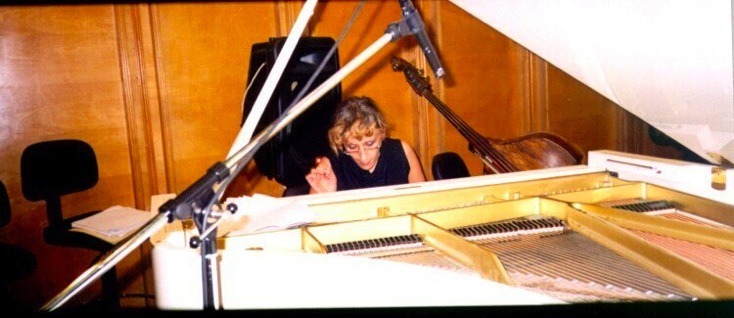
Je suis convaincu que votre travail en tant que compositeurs visionnaires, ainsi que le travail que vous faites avec l'Ensemble Hyperion, représentent pour moi la meilleure voie pour l'avenir de la musique contemporaine.
Je partage avec vous en tant que compositeur moi-même cette approche à la composition musicale qui est basée sur la transformation continuelle du son. Cette démarche se présente aujourd'hui comme la plus prometteuse dans les domaines de la musique instrumentale et de la musique assistée par ordinateur.
Les conférences que vous avez présentées sur "le geste" montrent que cette musique contemporaine que vous représentez si bien est capable de communiquer avec le public parce qu'elle vise le corps ainsi que l'esprit.
Gérard Pape, compositeur
___________________________________________
IANCU DUMITRESCU
“Dans le paysage si riche et si varié de la musique actuelle, il n’existe certes guère de personnalité plus radicale, plus audacieusement novatrice que Iancu Dumitrescu. A quarante ans, en sa triple qualité de compositeur, de chef d’orchestre et animateur, enfin d’écrivain, il s’affirme comme l’une des forces vives de la jeune musique, non seulement à l’échelle roumaine, mais internationale. A la tête de l’Ensemble Hyperion, qu’il a fondé en 1976 et qu’il dirige depuis, ensemble comprenant quelques-uns des plus brillants instrumentistes de Roumanie, il a fait connaître dans toute l’Europe non seulement ses ouvrages les plus significatifs, mais encore ceux de ses confrères représentant l’aile marchante et prospective de l’École roumaine.
Pour être hardiment projeté vers le futur, pour nous proposer un univers sonore pleinement inouï, l’art de Iancu Dumitrescu n’est pas moins fermement enraciné dans une tradition, nourrie des sucs fécondants de la terre roumaine. Il représente de manière exemplaire cette École à ce jour unique au monde, qui a trouvé les chemins de la plus exaltante aventure en retournant aux sources les plus ancestrales. Grâce à quoi il naît une musique absolument neuve, et pourtant accessible, compréhensible, aux antipodes de toute spéculation abstraite et de toute expérience de laboratoire.(…) Cette musique qui sans cesse déborde le système tempéré et se sert des micro-intervalles les plus ténus, ne sonne pourtant jamais de manière “dissonante”: c’est qu’elle se base sur l’exploration très poussée des harmoniques les plus éloignées dans le spectre. La jeune École roumaine, Iancu Dumitrescu en tête, n’est certes pas la seule qui situe actuellement ses recherches dans la direction d’une telle musique “spectrale” - hyper- consonante, hyperharmonique au vrai sens du terme! - car on observe des tendances parallèles dans la jeune École française (les musiciens du Groupe de l’Itinéraire), chez les jeunes Canadiens (le regretté Claude Vivier, Michel-Georges Brégent, J. Réa) ou Italiens (C. Ambrosini, A. Brizzi, etc.). Mais les Roumains, travaillant d’ailleurs longtemps à l’écart et dans un relatif isolement, peuvent revendiquer une certaine antériorité dans cette démarche qui aboutit, singulièrement avec Iancu Dumitrescu, à une véritable analyse spectrale de l’intérieur du son, équivalent à une sorte de fission nucléaire.(…)
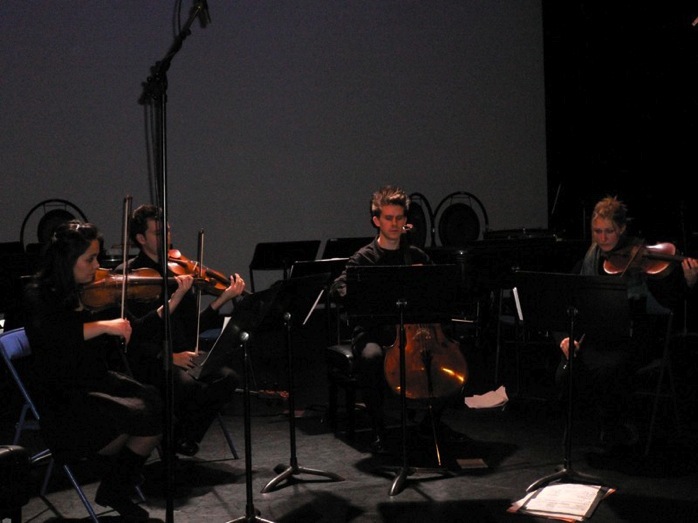
Les œuvres de Iancu Dumitrescu se situent en effet très loin des concepts traditionnels, non seulement en matière de son, mais de forme et de structure. Ses principales oeuvres font intervenir le concept d’acousmatique, terme socratique désignant l’art de cacher l’essence de la source sonore, d’en déguiser l’origine. Basée sur l’exploration intime des paramètres secrets, cachés, du phénomène sonore, sa musique tire ses modèles formels de la structure même du son, en une correspondance parfaite de la micro- et de la macro-structure. Cette approche phénoménologique de l’acte compositionnel implique à la fois une confiance très large en la dimension intuitive de l’invention et, correctif indispensable, une permanente lucidité intellectuelle. Composer devient ainsi une attitude de chirurgien ou de biologiste, travaillant directement sur le plasma sonore, sur la matière vivante et mobile. Cette attitude s’étend aux divers paramètres du son, et notamment à un système d’organisation des durées accordant à chaque nombre un rythme possédant son esthétique, son éthique et sa prégnance propres. Car le Temps, seul paramètre sonore existant aussi en dehors du son, est également celui qui sous-tend tous les autres : hauteurs, timbres et intensités s’évaluent en vibrations, en périodes, donc en temps.
(…) Fort de toutes les expériences acquises au cours des années de travail avec ses musiciens de l’Ensemble Hyperion et avec le grand contrebassiste italien Fernando Grillo, Iancu Dumitrescu a composé “Aulodie Mioritica” tout d’abord pour clarinette et orchestre, puis pour d’autres solistes. La version pour contrebasse solo et orchestre (“Aulodie Mioritica” Gamma) destinée à Fernando Grillo et créée par lui, a été terminée en juin 1984, et exécutée pour la première fois immédiatement après son achèvement à Radio-France par le dédicataire, avec le Nouvel Orchestre Philharmonique sous la direction de Yves Prin. L’orchestre est une formation relativement restreinte (vents par deux, cordes en effectifs mozartiens), mais avec une section importante de percussions. Par l’effet des conceptions acousmatiques du compositeur, cet ensemble si familier et si traditionnel se voit renouvelé par une dénaturation totale des timbres et des sonorités, dont l’étrangeté rivalise avec le solo de contrebasse. Celui-ci additionne les conquêtes techniques et sonores de l’interprète et du compositeur en des effets d’une extraordinaire nouveauté. Mais, fidèle au titre choisi ( le terme d’aulodie, plutôt réservé d’habitude à un instrument à vent, se justifie par l’utilisation très poussée des harmoniques et des sons flautando à la contrebasse! ), le compositeur nous offre ici une vision transfigurée, hautement stylisée, du chant ancestral des bergers des Carpates, dans l’esprit de la plus belle et de la plus émouvante des Ballades populaires roumaine: Miorita (l’Agnelle)”
Harry HALBREICH - Editions SALABERT - (Paris 1992)
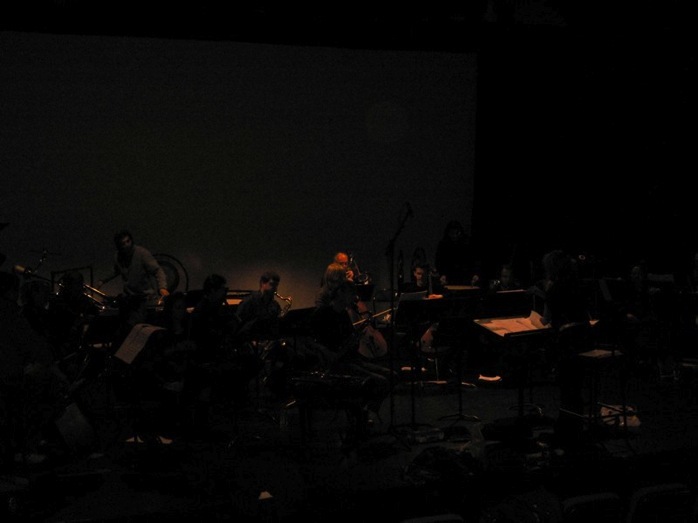
C’est aux côtés de P16.D4 que je découvrais, il y a bientôt 10 ans, la musique de Iancu DUMITRESCU. Aucun rapport entre ces deux noms, ces deux origines musicales...
Sauf que Selektion, label de P16.D4, collabora avec les ÉDITIONS RZ ( Robert Zank) pour publier un disque de Iancu DUMITRESCU. Traces d’échange et de décloissonement.
Ainsi découvrais-je après les montages bruts de cut des premiers, les longs mouvements dans les détails
infimes du son du second.
Je découvrais ensuite qu’on parlait de musique spectrale, que Iancu DUMITRESCU était roumain, né en 1944, de la même génération que Horatio Radulescu... et que l’ombre de Scelsi planait de ci, de là. Puis au fur et à mesure de ses disque (CDs publiés par les Éditions Modern) , je me plongeais plus en détail dans cette musique qui a digéré depuis longtemps les délires combinatoires du sérialisme pour s’intéresser au son ( ouf! il était temps) en utilisant les outils électroacoustiques si nécessaires.
JEROME NOETINGER- Interview avec iancu Dumitrescu dans « Revue et Corigée » , 1996
•"The extraordinary and uncategoriseable Dumitrescu / Avram team. (…)"
Chris CUTLER ReRMegacorp – London
•
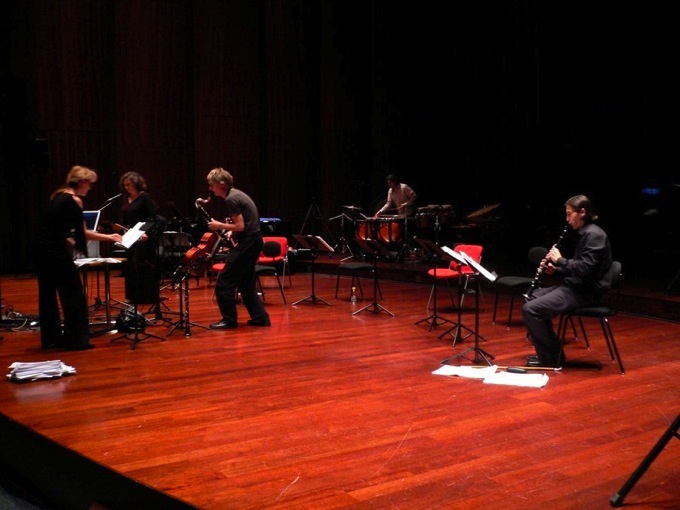
* "Iancu DUMITRESCU and Ana-Maria AVRAM. They have become leading figures in contemporary classical music, developing a musical language that sweeps boldly from very small scale insect-like sounds to vast noise laden soundscapes. In recent times they have attracted a lot of attention from musicians outside of the classical field, as the music is relevant to the post-ambient, post noise, post classical aesthetic which is the sound of the moment. FORCED EXPOSURE – Boston
•
".. Dumitrescu's acousmatic compositions are restless, detailed forays into the aesthetic of noise, dramatically penetrating the very fabric of instruments and articulating entirely new sounds - by turns violent, reflective, impassioned and eerily disarming." London. Royal Festival Hall, New Aura Series, LMC-BBC 3
* "Although two of the most compelling and exciting living composers” – Josh Ronsen-Austin,Texas, USA
* "A thundering, urban edifice illuminated only by flying sparks and reverberating with the hollow boom of deflected metal. But even the most staggering constructions are put together brick by brick, or note by note, and Dumitrescu pays great attention to detail, releasing vast amounts of energy like a nuclear explosion from the tiniest components." ALVINNE PRITCHARD, BBC Radio 3, London
* "The music of Iancu Dumitrescu explores the ultimate sense of sound guiding the listener through new spheres of sonic adventure, a kind of cryptical music..." Robert ZANK - Edition RZ - Berlin
* "...The music of Romania's leading composer Iancu Dumitrescu is spectral, electroacoustic, but above all it is a coherent totality grounded in a different conception. Of all living composers, Dumitrescu is the one who has most exploded sound. Dumitrescu's work is a negation, from the depths, of everything in contemporary music symptomatic of distraction, of banalisation, and of a radical loss of purpose. His music is not a new convolution in the knot of modern music, but an unraveling of the curse. (...)" Tim HODGKINSON - RESONANCE – London
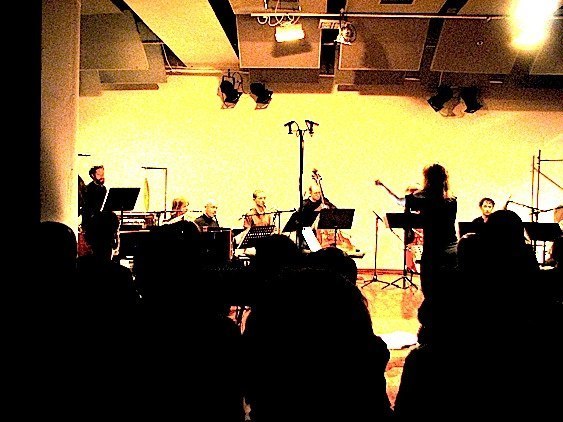
“Works also features three compositions by ANA-MARIA AVRAM, born in Bucharest in 1961. Wonderful to hear music where textural innovations aren't employed to colour pre-existing structures, but evolve form in process. On Zodiaque she plays prepared piano opposite Dumitrescu, a percussionist and magnetic tape.
Seems like these Romanians are engaged in a similar kind of sonic research to that which resulted in the masterpieces of Giacinto Scelsi and Ennio Morricone : collective endeavour, genuine "deep listenning". The results are similarly overpowering a milion miles from the tootling inconsecuence of most of what passes for New Music in the classical world.”
BEN WATSON - The Wire, London May 1995
Romanian composer IANCU DUMITRESCU and his associate, ANA-MARIA AVRAM, leading figures in the Eastern European school of modern classical music ( A ) Los Angeles, sept.1999
Of the three CD’s issued thus far, one also contains three excellent works by a pupil of his: ANA MARIA AVRAM, whose compositional style is every bit as fascinating and innovative, and is certainly a talent to look out for. .. Alan FREEMAN “AUDION“ , Leicester , March 1993
ANA-MARIA AVRAM recently composed a quartet for Kronos, and followed it up with “Nouvelle Axe”, peformed here by the strings of Romania’s Hyperion Ensemble, who also work with DUMITRESCU. It’s an uncompromising piece with a tendency to noise throughout, drawing blizzards of pizzicato, high - pitched sounds and lots of glissandos from the panoply of avant garde string effects.
ANDY HAMILTON - THE WIRE (49), August 1999, LONDON
Both Avram and Dumitrescu are convinced that if they have been able to open new doors in music, it is because they have made or found precisely those connections between musical activity and inner life that remain unarticulated in conventional musical training. This is not, however, simply a matter of theit philosophy and motivation as artists. The psychological reality if their music is directly grounded in a conception of the acoustic reality iof sound.
Tim Hodgkinson, Musicworks No 71, Summer 1998
